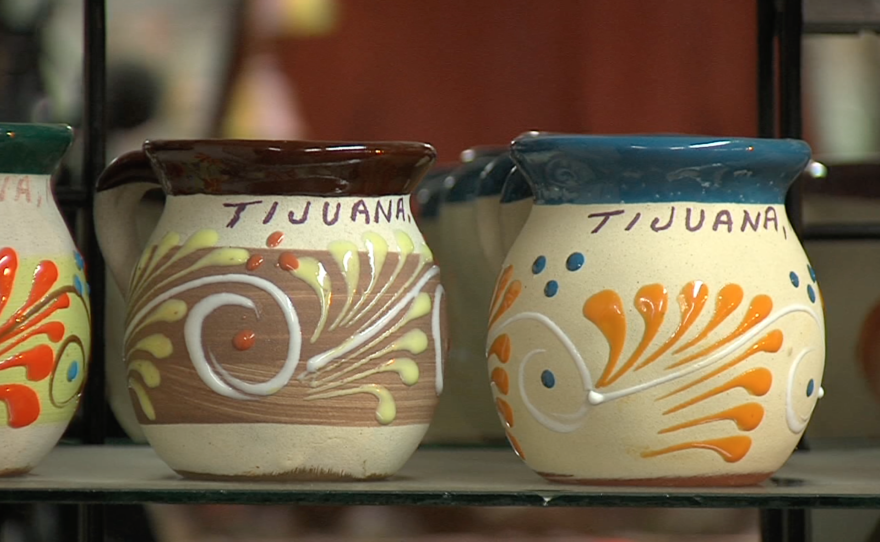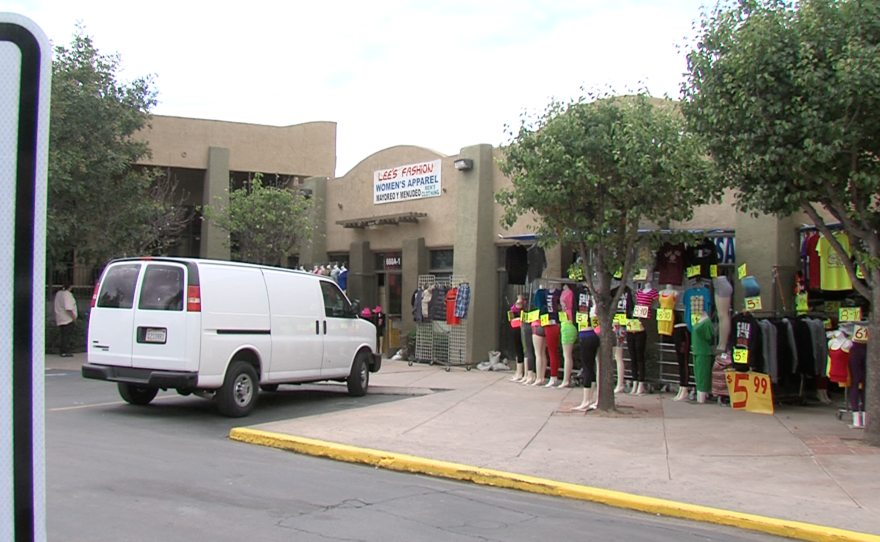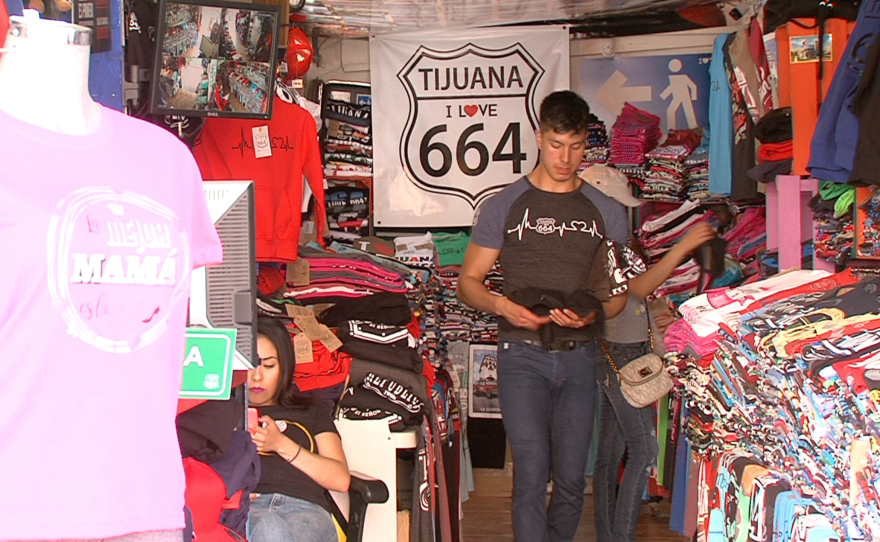President Trump’s stance on immigration is reshaping consumer tendencies in the San Diego-Tijuana region, with businesses in Mexico reaping profits that once went to stores in the U.S. amid a rise in Mexican patriotism.
Baja California visitors — primarily from Tijuana — spend more than $4.5 billion a year on retail and entertainment purchases in San Diego County, according to Crossborder Group, a Mexican market research entity. But many of them are now opting to make those same purchases in Tijuana.
Like thousands of other Tijuana shoppers, Lizbeth Miranda used to do a lot of her wardrobe shopping in San Diego. But she said Trump’s comments about Mexicans have made her feel “uncomfortable” and she now wants to show off her Mexican pride by buying clothes at home.
Earlier this month, she bought several T-shirts emblazoned with Tijuana’s area code, 664, at a store called "Tijuana: I Love 664."
“I like buying things here more, to support my country,” Miranda said. “I’m proud of being Mexican and want to support my country.”
People in Mexico have been paying close attention to Trump’s comments about immigrants because many have families in the U.S. that could be affected by his policies. Many are offended by his descriptions of immigrants as “rapists” and “criminals,” and his claim that Mexico will pay for a $20-billion-plus border wall.
The anger has triggered a newfound sense of Mexican patriotism, which has been beneficial for Tijuana retail, according to Tijuana's Chamber of Commerce. Rumors about tougher customs inspections are also scaring consumers away from San Diego, and instead, boosting consumer spending in Tijuana.
“I think all of the publicity about Trump, about his wall, and all of that bla-bla-bla, I think lots of local (Tijuana) people have stopped buying American products and have stopped shopping in the U.S.,” said Felipe Acevedo, a Tijuana arts and crafts vendor who said he's seeing a boom in sales to Mexican customers.

Acevedo said Tijuana residents are increasingly interested in ceramic mugs, sombreros and other products that are “made in Mexico.” His store is located on Avenida Revolución, which used to cater to San Diego tourists in quest of cheap margaritas and Mexican souvenirs. Now, the street is crowded with residents from Mexico and offers merchandise geared toward locals.
Tijuana’s Chamber of Commerce launched a campaign in November to ride the new wave of Mexican pride: “Yo Compro en Tijuana,” or “I Shop In Tijuana.” It encourages businesses to do what they can to compete with San Diego businesses – for example, allowing customers to return items that are broken or do not fit, a practice that is less common in Mexico than in the U.S.
“(Trump) has awakened a sense of Mexican patriotism,” said Mario Escobedo Carignan, president of Tijuana’s Chamber of Commerce. “He says, ‘America first, then the rest of the world.’ So we’re doing the same.”
While Tijuana has seen benefits of Trump’s comments about Mexico, San Diego businesses are taking a hit. The neighborhood of San Ysidro, which sits on the north side of the border, used to be a magnet for Tijuana shoppers. Not anymore.
Sunil Gakhreja owns Sunny Perfumes in downtown San Ysidro. He said his business has seen a 50 percent decrease in sales since Trump was elected.
“Ninety-nine percent of our customers are Mexico based. If they don’t cross, we don’t sell. And not just my store. All over San Ysidro,” he said.
On holidays, Sunny Perfumes used to become so crowded that Gakhreja had to hire extra help. But on Mother’s Day this year, he needed only one employee, and most of the time, the store was empty.
“We are in trouble,” he said.
Olivia Campos is the owner of Carolin Shoes next door. She said rumors tied to Trump’s stance on immigration are discouraging people from crossing the border into the U.S. because they fear interacting with customs officers.
“They’re afraid they’ll take away their passports, their green cards, some people say they’re even checking cell phones,” she said.
Campos said sales in her store dropped 70 percent since November.
Business in San Ysidro was already struggling last year because of a plummeting Mexican peso, which was hurting the purchasing power of Tijuana consumers. The exchange rate has since stabilized, but retail stores are still having a hard time.

Executive Director of the San Ysidro Chamber of Commerce, Jason Wells, said fear, uncertainty and anger tied to the Trump administration are now to blame for San Ysidro’s struggling economy.
He said retail citywide has dropped 30 to 50 percent in the past year, with non-brand clothing stores seeing the greatest decrease of 65 percent.
“A lot of this has been the national rhetoric,” he said. “And yes, there is a fear, and it’s palpable, you can feel it in the street.”
Wells said San Ysidro is trying to devise new strategies to recover lost business – perhaps diversifying products and services, or offering discounts. But for now, Mexico continues to reap the profits that once belonged to the U.S.
“I get asked about the wall all the time. And I said, you know what, a future physical wall isn’t a problem. It’s the current psychological wall that this White House has already built,” he said.
This is KPBS Midday Edition I am Maureen Cavanaugh. President Trump's stance on immigration is fueling a newfound sense of patriotism among Mexicans. It is reshaping the way consumers spend money in the San Diego Tijuana region. Mexico is reaping profits that used to come to the US. Our reporter Jean Guerrero explains. Lisbeth Miranda is buying a T-shirt in Tijuana. It has the number 664 emblazoned across the front. 664 is the Tijuana area code. Thousands of other Tijuana residence she used to drive to the US to do close shopping in San Diego. Now she prefers to shop south of the border. [ speaking in a foreign language ]. I prefer to buy things here to support my country. She says Trump's negative comments about Mexicans have made her want to show off her Mexican pride. She is not alone. I mean Tijuana Avenue used to attract mostly tourists who wanted to have a cheap margarita or by Mexican souvenirs. Now it is crowded with Mexicans who want to shop here as well. The president of Tijuana's Chamber of Commerce says President Trump's immigration rhetoric is offensive. Everything from Trump's descriptions of immigrants as rapists to the claims that they will pay for the new border wall. It's awakened a new sense of patriotism and has been great. [ speaking in a foreign language ]. Tijuana vendors like this one are starting to offer merchandise specifically toward locals. Another store sells home decorating items showcasing Tijuana pride. Hector works the cash register. He says the store has seen a boom. There is just nothing for them there. He said it is because Tijuana is offering better prices. Trump also has something to do with it. It is definitely like a trending topic with everybody. Everyone knows about Trump and about the wall and everybody cares about it. Tijuana has in the present -- benefits of the the president's comments about Mexico. The neighborhood of San Ysidro which is when on the north side of the border used to be a magnet for Tijuana shoppers cannot anymore. The Chamber of Commerce has jumped 30 to 50% in the past year. 99% customers Imex -- Mexico based. He has seen a 50% decrease in sales since Trump was elected. Olivia is the owner of the shoe store next door. She said rumors tied to the stance on immigration have also encouraged people to stay on this side of the border. Some people say they are even checking cell phones. Sales in the store have limited 70% since November. Business in San Ysidro is already down mostly because of the plummeting Mexican peso which was in -- hurting the purchasing power of Tijuana consumers in the US. Industry has since stabilized. Jason Wiles now says that fear and uncertainty are to blame for the struggling economy. I asked about the wall all of the time. I said you know what a future physical wall is not a problem. It is the current psychological wall that the White House has already built. The community is trying to advise new strategies to recover lost business in the US. They are offering discounts. For now they will continue to read the prophets. Joining the is Jason Wiles executive director of the San Ysidro Chamber of Commerce. Tell us more about how Tijuana and Baja shoppers have typically crashed into the US to make purchases. Typically you had each family coming across sometimes daily sometimes once a week. There is a large number of workers in the US that live in Tijuana and the Rosarito area. They may be coming every day just buying new things. Ever since the early to mid 2000 when there was the perception of violence due to the war on drugs and so forth. We as a region really lost a lot of the casual tourist for the local tourist. Really with 135 crossing -- thousand crossing today the majority of them are coming three or more times a week. It is either school work relatives what have you. Those are constant shoppers lower amount and lower purchases. You saw a little bit of drop off around 2007 2008 that when did you notice this pitfall of starting to occur. 2007 2008 some people decided to start crossing. The next step interestingly enough was not the economy taking in 2008 because it hit Mexico later. Folks were still coming. The next step was 2012 after CBP started hundred % inspections. That started causing wait times to get over the next two hours. About a year and a half ago and the peso got 17-1 after years of being 10 inch and 12 inch for a few years. Sought jump up to 22 after the last election. Are certain businesses hurting more than others. We still have a thriving industry the cell phone business and so forth obviously the brand name clothing outlets for non-brand-name warehouse clothing. It is ridiculous to change the money anyway. The court businesses are still doing very well. Got a lot of the markups on the Boulevard that are suffering from this. We have seen I would say the casual shoppers. What we have seen since the last election is just because of the uncertainty of what is going on. Are the checking phones are certain types of visas. Since the election we have seen a huge drop off of some of the smallest of our businesses. We heard that a couple of those business owners are losing 30 -- up to 70% of their business. How does a small business survive if business drops off. Unfortunately what we have seen is that they don't. Otherwise just due to the magnitude of crossings that we have the holiday season is still keeping some of. Our last holiday season was just in December. People were still really not understanding what had just happened. This year is going to be very telling. If there really is a surge in patriotism and Mexico that is fueling this is in Tijuana how do they compete. One of the things we are doing -- San Ysidro had never been set up to serve the residents in our area. Number one it is a very disadvantaged community and because it is very -- fairly new to have the residential area their people remember their grandparents there was not a whole lot of houses around. It's just people my age that is remembering the grandparents house. I have never really been conditions to serve the resident. Now we've got several housing areas like coral gates Remington Hills and Oceanview Hills that are 600 houses and people that spending abilities and so forth. However we can't change the basis of who we are. We serve a binational region. It is very unfortunate that it is understandable why they were kind of start taken that turn to Dave be in the chambers of commerce and so forth and Mexico the one thing I preached is that the one way that we need to combat this Frederick etc. but people who are ignorant is just to keep living our lives. Keep the in the example of what is great and beautiful and works between our countries. Whether facts are important or not our lives are. Cannot dispute the economy of the region. Cannot dispute what works between our regions. We have to keep doing what we are doing. Just saying shop here on one side of the border or another is not who we are. I have been speaking with the executive director of the Chamber of Commerce Jason Wiles. Thank you.






